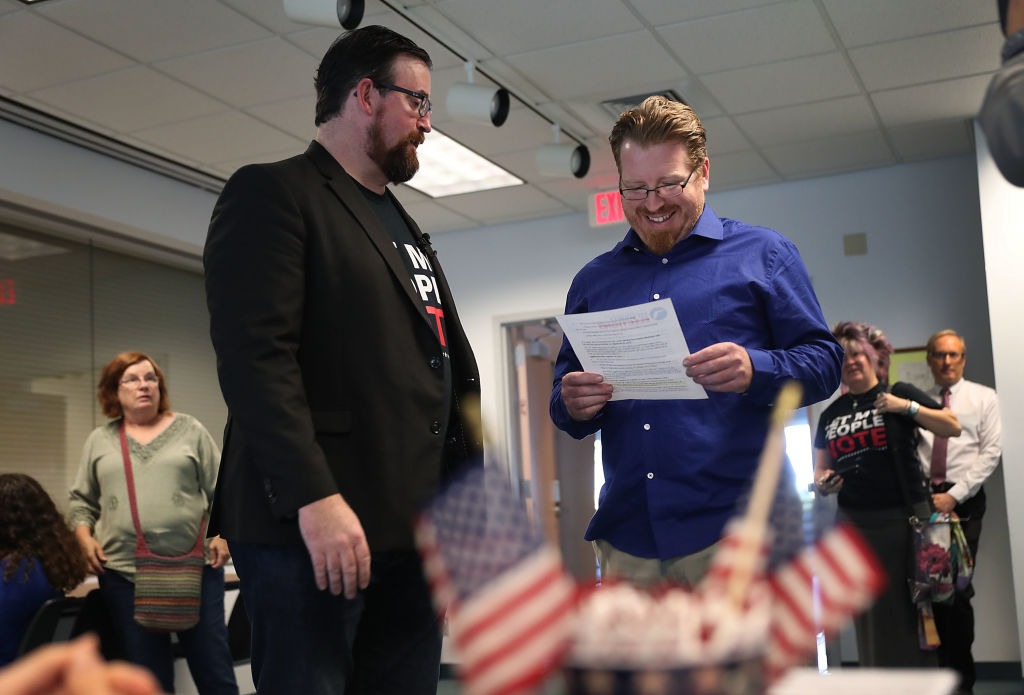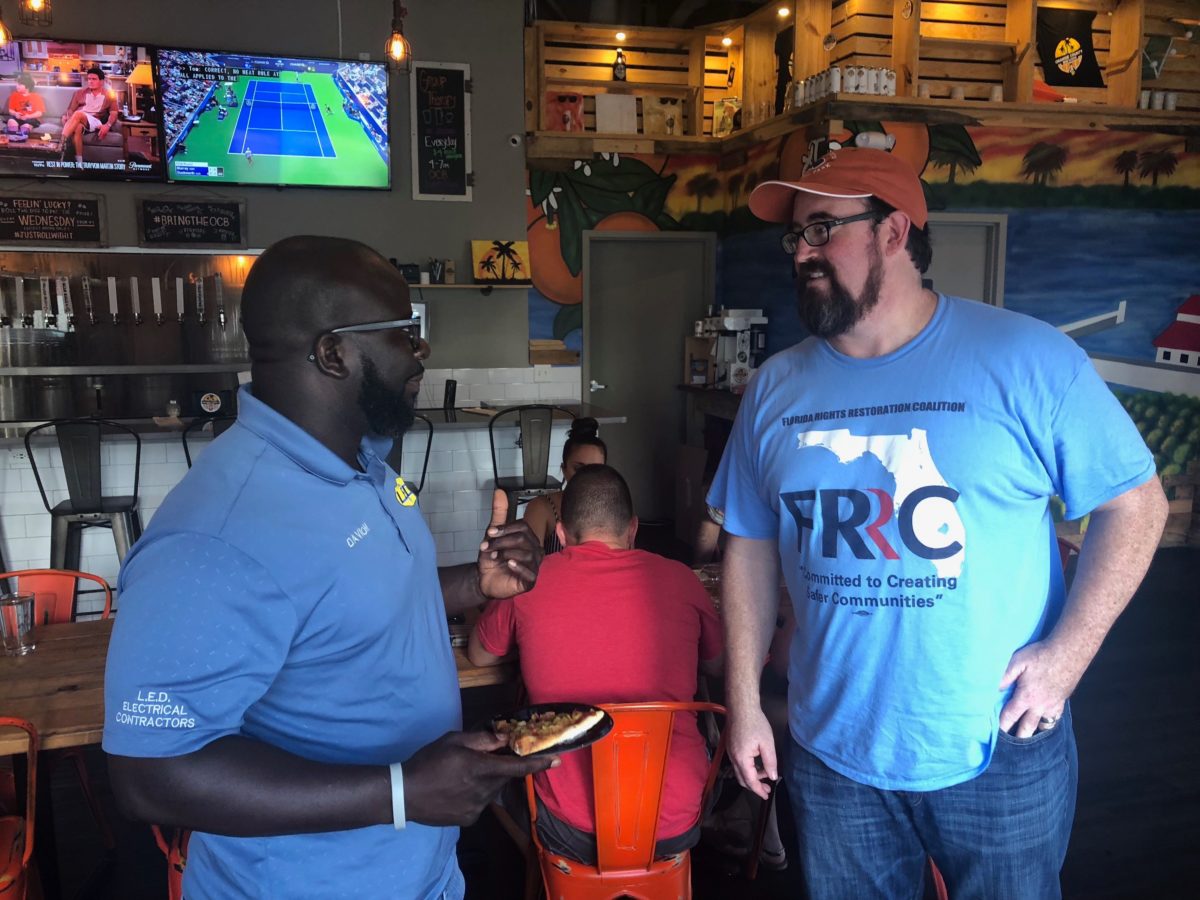Undercutting reform, Florida moves to ban certain people from ever voting again
Lawmakers are redefining certain crimes in order to carve out broad exceptions to who can regain the right to vote.

When Lance Wissinger was 24, he made the mistake of driving his friend home from a bar after a day at a baseball game. The next thing he knew, he said, his car spun out of control, flipped, and ejected him and his friend onto the road. Wissinger sustained serious injuries and his friend, who rolled under the car, died almost immediately.
Wissinger’s blood alcohol level was above the legal limit, and he was convicted of DUI manslaughter. He spent roughly four-and-a-half years in prison, where he reflected on his mistake and decided to do what he could to help others in his position.
A few years later, while living in Fort Myers, he connected with the Florida Rights Restoration Coalition (FRRC) and helped fight for the restoration of voting rights for more than a million Floridians with felony records. In November, Wissinger, who is now 39, celebrated that he would finally regain his civil rights.
Wissinger now worries that celebration might have been premature. As Florida’s legislature meets this month, some lawmakers are trying to carve out broad exceptions to who can regain the right to vote. The amendment could exclude people who are still paying off fines and fees — and it could bar people convicted of such crimes as manslaughter, vehicular homicide, and attempted murder from ever voting again.
“I didn’t willingly have a gun or an object to create or cause harm, but what I did was make a poor choice,” Wissinger told The Appeal, explaining that he doesn’t believe he should be considered someone “convicted of murder.”
The constitutional amendment approved in November by 65 percent of Florida voters reinstates voting rights to U.S. citizens with felony convictions who have completed their sentences except those “convicted of murder or a felony sexual offense.” But lawmakers are still trying to hammer out what exactly that exception includes.
On Tuesday, the House criminal justice subcommittee debated and advanced a bill that includes a number of restrictions to the voting rights restoration amendment. Though it would not broaden the definition of murder beyond first and second-degree offenses, it would add dozens of sex-related offenses to the list of crimes that constitute “felony sexual offense,” such as trafficking and locating an adult entertainment store within 2,500 feet of a school, according to the Orlando Sentinel.
The bill also would require that court fines, fees, and financial obligations be paid off before someone is eligible to register to vote, even if the fees were not part of someone’s sentence and even if the individual never went to prison. Voting advocates call that stipulation a modern day poll tax. Rep. James Grant, the criminal justice committee’s chairman, disputed that characterization.
We’re going to fight as hard as we can to make sure the intent of the voters is upheld.
Neil Volz political director of the Florida Rights Restoration Coalition (FRRC)
Calling his bill a poll tax “diminishes the atrocity” of historical poll taxes, Grant said during the hearing. “To compare that to this is a slap in the face.”
The state Senate has not yet acted to clarify Amendment 4, and it’s possible that the version of the bill from the upper chamber could expand the definition of murder to include such crimes as manslaughter, vehicular homicide, and attempted murder.
Jeff Brandes, a Republican and one of the key senators drafting clarifying legislation this month, said he believed attempted murder should be a disqualifying offense.
“The question is, ‘What does it include?,’” Brandes said, according to the Tampa Bay Times. “Obviously murder—first degree, second degree—to me, that means attempted murder, because there’s intent.”
Grant and Brandes did not respond to The Appeal’s requests for comment.
Other lawmakers disagreed on which crimes should be included. Michael Gottlieb, a state representative and a former defense attorney, said that individuals convicted of manslaughter should not be included with those convicted of first- and second-degree murder.
“I didn’t think we should muddy the waters putting manslaughter into murder,” he told The Appeal. “One can be a negligent act, and the other is an intentional act.”
Still, he agreed that the Legislature needs to take action to clarify any confusion.
“Unfortunately these amendments, while well-intended, are placed on the ballot by certain groups and they’re not really vetted by the legislative process, where we get into committee and we really talk and try to get rid of these kind of problems and these types of distinctions,” Gottlieb told The Appeal.
According to the News Service of Florida, Grant instructed staff to include all felony sex offenses in the legislation.
“When the Constitution says ‘felony sex offenses,’ and that means nothing legally, the best I can do is propose a list of felonies that are sexual,” Grant said. “The reality is I’m going to do my best effort to maintain what I believe the rule of law now requires in a super-ambiguous constitutional amendment.”
Not everyone agrees that clarifying legislation is necessary. The ACLU of Florida says that the law is clear on what constitutes murder and felony sexual offense and the Legislature does not need to act in order to clarify the terms.

“The language was precise, was specific, and was designed to be self-implementing,” Micah Kubic, executive director of the ACLU of Florida, told The Appeal. “There is no need for additional clarification. The specific offenses that are excluded were spelled out in the language of the constitutional amendment, and they refer to specific things.”
Kirk Bailey, political director for the ACLU of Florida, told the Orlando Sentinel that the House bill is “an affront to Florida voters.”
“This is exactly what we were worried about from the beginning,” he said.
Neil Volz, political director of the FRRC, the group that led the effort to pass Amendment 4, told The Appeal that the drafters of Amendment 4 intended to exclude only those convicted of the “worst instances” of murder and sexual assault. Florida voters adopted the amendment with that intention in mind, he said.
“We’re going to fight as hard as we can to make sure the intent of the voters is upheld,” he said.
Lawmakers and advocates say they are concerned that there will be two negative consequences if the amendment is confusing or is clarified in ways that make it even more confusing.
Some are concerned that people may falsely believe they are eligible to vote when in fact they are not. If those people check the box on their voter registration applications indicating they have had their rights restored, they could be guilty of perjury—a felony that could send them back to jail.
Jack Campbell, a state attorney in the Florida panhandle, said that the bill is written in such away that he would not be able to prosecute anyone for voter fraud.
“Right now, that is ambiguous enough that my opinion is we are not going to be able to prosecute anybody unless it’s pretty blatant examples of fraud,” he told The Appeal. “For instance, if you’re currently incarcerated and you try to register.”
Campbell said that in order for him to be able to prosecute individuals for violating the law, the Legislature would have to clearly delineate which crimes are excluded and what qualifies as murder.
“I can’t exactly expect somebody to follow a law explicitly if I don’t understand what it says because I’m obviously more sophisticated than most people when it comes to criminal laws,” he said.
People who are in fact eligible might believe themselves not to be and decline to register as a result.
Micah Kubic executive director of the ACLU of Florida
“If it’s nebulous, it’s not going to be prosecutable,” he added, explaining that Florida prosecutors are not “interested in prosecuting somebody who didn’t understand where the line is.”
Voting advocates say they are encouraged by Campbell and other prosecutors’ declarations that they do not plan to bring charges against returning citizens for potential voter fraud, but, Kubic noted, there’s no guarantee that all prosecutors will feel the same way.
Kubic said that people have also been prosecuted in Florida in situations where it seemed as though they lacked intent to violate the law.
“There are a number of offenses that require intent where people have been prosecuted under circumstances that others might describe as lacking intent,” he said. “It really does come down to prosecutorial discretion.”
Campbell, said he had no interest in filing charges against individuals who do not understand the law. In order to achieve that, some lawmakers said that Amendment 4 needs to be clarified.
“We really need to do something to try to uphold the intent of the voters and at the same time, make sure that we’re not recriminalizing people for making mistakes if they register,” Gottlieb said.
But another risk, which worries Kubic of the ACLU more than possible fraud, is that clarifying legislation might have a chilling effect on voter registration. If returning citizens are unsure whether they qualify for rights restoration, they may decide not to register and vote at all.
“The bigger concern that I would have is that people who are in fact eligible might believe themselves not to be and decline to register as a result,” Kubic said. “The misinformation would serve as a block on folks who are in fact eligible, even under this more onerous, more difficult standard.”
Despite data showing an uptick in voter registrations since Amendment 4 went into effect—Kubic said voter registration was up roughly 36 percent in January compared with the same period the two years prior—he still worries that this chilling effect could substantially reduce the number of people casting ballots.
“You could have thousands and thousands and thousands of people in that position who might be unclear on their status and so decline to register.”
